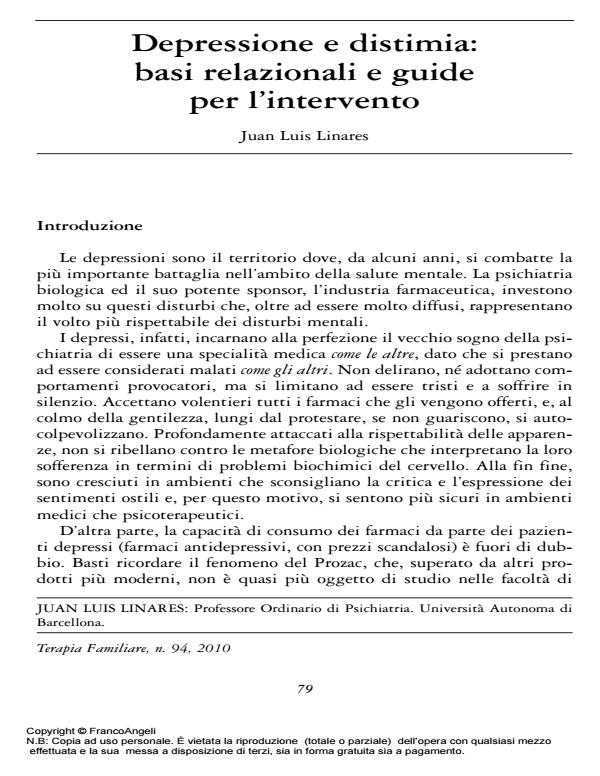Depressione e distimia: basi relazionali e guide per l’intervento
Journal title TERAPIA FAMILIARE
Author/s Juan Luis Linares
Publishing Year 2011 Issue 2010/94
Language Italian Pages 16 P. 79-94 File size 353 KB
DOI 10.3280/TF2010-094006
DOI is like a bar code for intellectual property: to have more infomation
click here
Below, you can see the article first page
If you want to buy this article in PDF format, you can do it, following the instructions to buy download credits

FrancoAngeli is member of Publishers International Linking Association, Inc (PILA), a not-for-profit association which run the CrossRef service enabling links to and from online scholarly content.
The paper highlights the importance of distinguishing between two basic forms of depression: one more severe, heir to what used to be referred to as manic-depressive psychosis and the other milder and of a neurotic nature (dysthymia). In the family of origin of the patient with major depression one generally finds a well-matched parental couple with a complementary relationship, accompanied by a failure of the parental functions in the context of excessive demands and a lack of appreciation. Disqualified, the patient tends also to construct a complementary couple relationship, one which becomes rigid when, with the expectations of protection and appreciation having been thwarted, symptoms intervene and the circle of disqualification is closed. In contrast, the dysthymic patient is the child of ill-matched parents who triangulate the patient and steer him/her toward a coalition with one of them and antagonism toward the other. Imitating the parental model the patient tends to construct a symmetrical couple relationship, in which symptoms form an integral part of the corresponding power games. Therapeutic interventions should focus primarily on the couple, although cases of major depression also receive great benefit from work with the family of origin and individual therapy with the patient him/herself.
Keywords: Major depression, dysthymia, family of origin, couple, mythology, organization
Juan Luis Linares, Depressione e distimia: basi relazionali e guide per l’intervento in "TERAPIA FAMILIARE" 94/2010, pp 79-94, DOI: 10.3280/TF2010-094006